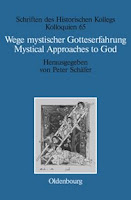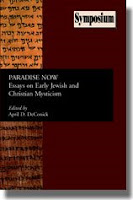What is happening in the field of Jewish and Christian Mysticism? and Article Note: "Communion with the Angels" by Peter Schäfer
/ Peter Schäfer just sent me an offprint of one of his most recent publications, an article published in his edited conference volume: Wege mystischer Gotteserfahrung: Judentum, Christentum und Islam = Mystical approaches to God : Judaism, Christianity, and Islam (München: Oldenbourg, 2006) pp. 37-66. I want to highlight this particular article because in it Schäfer grapples with Qumran, a Jewish community with literature and liturgies filled with mystical practices. In this piece, he does not argue for or against religious experience, but appears to me to be taking very seriously the plethora of references to religious practices in this corpus. Schäfer, in this article, discusses the Qumran literature from the perspective of a community which conceived of itself as a community of priests, who lived in absolute cultic purity and believed themselves to be united with the angels. Sometimes this unity is had through liturgical communion (such as in the Hodayot and related texts) - the sectarians join with the praise of the angels in heaven.
Peter Schäfer just sent me an offprint of one of his most recent publications, an article published in his edited conference volume: Wege mystischer Gotteserfahrung: Judentum, Christentum und Islam = Mystical approaches to God : Judaism, Christianity, and Islam (München: Oldenbourg, 2006) pp. 37-66. I want to highlight this particular article because in it Schäfer grapples with Qumran, a Jewish community with literature and liturgies filled with mystical practices. In this piece, he does not argue for or against religious experience, but appears to me to be taking very seriously the plethora of references to religious practices in this corpus. Schäfer, in this article, discusses the Qumran literature from the perspective of a community which conceived of itself as a community of priests, who lived in absolute cultic purity and believed themselves to be united with the angels. Sometimes this unity is had through liturgical communion (such as in the Hodayot and related texts) - the sectarians join with the praise of the angels in heaven.He thinks, however, that the Qumran literature cannot be understood as the hidden source of what is later Merkavah or Hekhalot mysticism, because the Qumran literature should not be read in terms of ascent through the seven heavens, nor does their literature highlight a vision of God on his glorious throne. What we see in the Qumran literature is not a unio mystica, but a unio angelica and perhaps a unio liturgica. He also recognizes that this is a communal experience, not an individual one.
As you may already know from my own work on mysticism, I have my differences from the "Schäferian" approach to the study of early Jewish mysticism, particularly its emphasis on the production of this literature out of an exegetical impulse mainly, at the expense of religious experience. And I'm not convinced that there is no evidence for the type of ascent mysticism that Schäfer argues is not present in Qumran literature. Regardless, my own approach is to consider the intersection of exegesis and experience, and to take very seriously the mystical tradition as a living practiced religious tradition. So the question that was foremost in my mind when I read this new article by Schäfer was: Are we beginning to see some consolidation in the field, some sense that we absolutely must explain the liturgical, magical-theurgical and ritual aspects of it, that perhaps there is an element of the "experiential" (=my word) within it?
 So there is much good to say about Schäfer's article in my opinion, because it pushes, whether intentionally or unintentionally, in a couple of directions that I think are essential for the future of our study of early Jewish and Christian mysticism. I have written about this previously in Paradise Now, where can be found my own essay ("What is Early Jewish and Christian Mysticism?"), attempting to map this fledging field of study. The first "new" direction we must go is to recognize that mysticism to early Jews and Christians was not understood to have the characteristics of "Underhill" mysticism. The transformation usually was an angelification, not an assumption into God himself, as Schäfer notes about Qumran. Whether Schäfer thinks this a special type of mysticism or no mysticism at all was not clear to me, but I certainly define it it in terms of mysticism. As I have argued in Paradise Now, we need to define "mysticism" out of the literature rather than imposing a modern definition on the literature to see if "our" mysticism is there! If the transformation they were talking about is angelification and not union with God, then we need to acknowledge that. I did notice that Schäfer was still struggling with these old definitions of "mysticism" while also assuming them - the "Underhillian" emphasis on the "individual" and "union with God" in particular.
So there is much good to say about Schäfer's article in my opinion, because it pushes, whether intentionally or unintentionally, in a couple of directions that I think are essential for the future of our study of early Jewish and Christian mysticism. I have written about this previously in Paradise Now, where can be found my own essay ("What is Early Jewish and Christian Mysticism?"), attempting to map this fledging field of study. The first "new" direction we must go is to recognize that mysticism to early Jews and Christians was not understood to have the characteristics of "Underhill" mysticism. The transformation usually was an angelification, not an assumption into God himself, as Schäfer notes about Qumran. Whether Schäfer thinks this a special type of mysticism or no mysticism at all was not clear to me, but I certainly define it it in terms of mysticism. As I have argued in Paradise Now, we need to define "mysticism" out of the literature rather than imposing a modern definition on the literature to see if "our" mysticism is there! If the transformation they were talking about is angelification and not union with God, then we need to acknowledge that. I did notice that Schäfer was still struggling with these old definitions of "mysticism" while also assuming them - the "Underhillian" emphasis on the "individual" and "union with God" in particular.Second, there has been a tendency in this field of study toward perennialism and phenomenology. In other words, mystical themes like "vision of God," "ascent journey," "merkavah," etc. have been understood to represent a static concept of merkavah or hekhalot mysticism that had its origin in earlier Jewish literature or community. Christian varieties have been understood to have evolved out of this Jewish origin, but exactly how this happened has not been addressed. At any rate, there has been the tendency to see all instances of a certain theme across the literature as representative of some universal theme or practice that all groups are using the same way and inheriting from each other.
I have come to recognize over the last ten years that this paradigm is problematic, not the least of which because it is a linear model of evolution, when in fact we are dealing with a wide web or matrix of mystical views and practices, and a dynamism that is overwhelming. I think that the time is now to begin the complex process of mapping the emergence of mystical traditions within different communal settings - both in terms of belief and practice. I think that Peter Schäfer is doing this in this article, and I think that this is the type of study we need to be conducting in the future.
The members of the SBL section Early Jewish and Christian Mysticism already had a long discussion about this at our last meeting in Washington, D.C. To address it, members of the group decided to launch a new multi-year project to determine possible provenances of early mysticism in Judaism and Christianity. We are operating in rough chronological order beginning with the Ancient Near East in San Diego, 2007. We decided on this new agenda when we met as a group last November, because we wish to create a forum to discuss how, why, and in what forms mysticism emerges at various times, locations, and communities prior to 500 CE. Papers from the sessions will be collected for inclusion in series of volumes called, After Paradise Now: Essays Exploring the Provenances of Mysticism in Early Judaism and Christianity.
In 2008, we will look for papers in Hebrew Bible and Enochic literature, so those of you who are interested in submitting a paper should contact Kevin Sullivan (ksulliva@iwu.edu) who is chairing the program unit.








































































